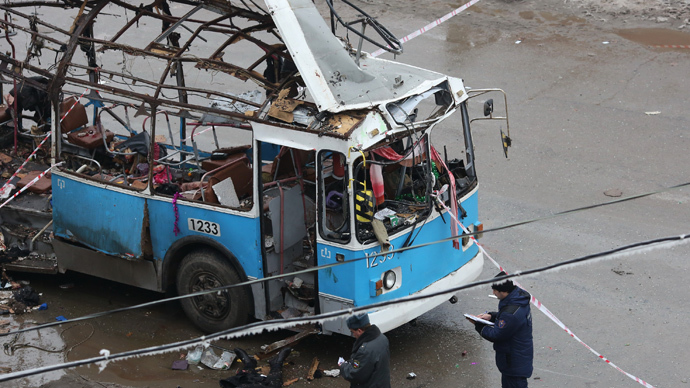'Olympics, int'l events are attractive targets for terrorists'

In the wake of Volgograd suicide bombings which killed over 30 people, the Caucasus region has been thrown back into the spotlight. But the attacks actually reflect a widening of the terror campaign, James Corbett, editor of The Corbett Report, told RT.
RT:Do you think big international events like the Olympic Games are a major attraction for terrorists?
James Corbett: Of course such events as the
Olympics do present an attractive target because the world’s eyes
are really on whatever city is hosting it. We have to look at
these current bombings in Volgograd as a potential spreading and
widening of the trouble that has been taking place in the North
Caucasus region. But I think what these blasts really indicate is
a widening of that threat and an expansion of it into the city
that is beyond the North Caucasus region itself, where those
types of attacks are more common, into a transport hub that
connects the North Caucasus to the rest of Russia. So it has to
be seen as an implication at least of the widening terror
campaign.
RT:The July 2005 London bombings also
targeted the public transport system, just like the attacks in
Volgograd did. What do those similarities tell us?
JC: Well, not a lot because there are a lot of
different events that we could look at, including the 1980
Bologna station bombing back in Italy, which of course was linked
to operation Gladio which was run by NATO forces. And in fact,
it’s a rather sad irony of this entire event that current NATO
Secretary-General Anders Fogh Rasmussen has just taken to Twitter
to give his condolences to the people of Russia.
This is a sad irony because, of course, many Chechen rebels have
been harbored through the EU political asylum in European nations
and NATO countries themselves, including France, Poland, and
Britain - where the of the former Chechen rebel leaders, Ahmed
Zakaev, has been residing for a number of years now. So it’s kind
of ironic that that’s happening.
RT:In London, the attacks were carried out
by Islamic radicals. Is it the same case in Volgograd?
JC: Well of course the Islamic radicals are the
ones that tend to carry out these attacks. But the ones that are
directing, funding, fostering, and training them tend to be
located elsewhere.
RT:Do you expect anyone to claim
responsibility for the attacks in Volgograd anytime soon?
JC: I don’t know if that will be coming, but as
we know, of course these bombings are linked; we can tell that
from the forensic evidence of the bombs themselves and the types
of agents that were added to them. So there’s no doubt that there
is part of a terror message that is being delivered to Russia
right now, and of course the fact that the Sochi Olympics are
right around the corner is obviously a key component of that
message.
The statements, views and opinions expressed in this column are solely those of the author and do not necessarily represent those of RT.
The statements, views and opinions expressed in this column are solely those of the author and do not necessarily represent those of RT.












